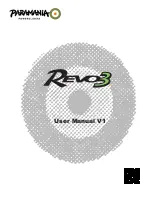
Page 15
Overloading
The NIKITA 2 is a very strong paraglider. Flying all the descent or acrobatic
manoeuvres will not normally pose a structural problembut aerobatic training does
accelerate the ageing process dramatically.
Attention: ICARO recommends having wings that are often used for
training of descent manoeuvres or acrobatics subjected to
checkups at shorter intervals than normally stipulated.
Salt water
If you are flying near the sea mostthe wing may age faster because the air is
humid and salty. In this case we suggest you have it checked more often than
prescribed in this manual.
Attention:
Never use chemical cleaning agents, brushes or hard sponges
on the material, as these destroy the coating and affect the
strength of the cloth. The canopy will become porous and
will loose structural strength.
Never attempt to clean your paraglider in a washing machine.
Even without using detergents the simple mechanical
abrasion will quickly finish the canopy and render it useless.
Also avoid dipping it in a swimming pool; the chlorine will
damage the cloth.
If you must rinse or clean your glider do so with fresh water.
Frequent cleaning will accelerate the ageing process.
Repairs
Small holes in the canopy can be repaired by the pilot by using self adhesive
sailcloth on both sides of the perforation.
Damage to the lines or any other repairs should only be carried out at an
authorized ICARO centre. If your NIKITA 2 needs to be repaired, please contact
your local ICARO Paragliders dealer.
Inspection, Prerequisites and Personal qualification
Your NIKITA 2 has no label, so they must also not required to inspection but it is
very important to check the glider, too. Below you find the regulations for checks of
certified gliders.
You will need the following items in order to perform a paraglider inspection:
•
Standardized inspection report
•
Porosity meter
•
Spring scale
•
Equipment for measuring line lengths
•
Equipment for line strength testing
•
Sewing machine
•
Big, clean and bright room































